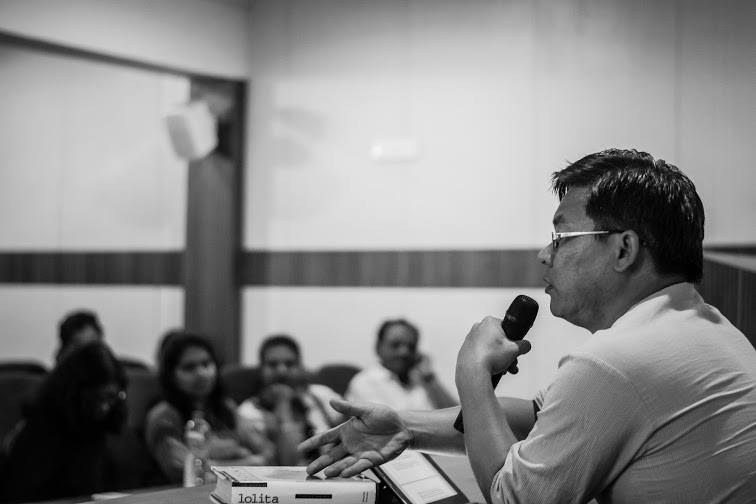“Lolita, light of my life, fire of my loins. My sin, my soul. Lo-lee-ta: the tip of the tongue taking a trip of three steps down the palate to tap, at three, on the teeth. Lo. Lee. Ta.
She was Lo, plain Lo, in the morning, standing four feet ten in one sock. She was Lola in slacks. She was Dolly in school. She was Dolores on the dotted line. But in my arms she was always Lolita”.
After reading the first two paragraphs of Vladimir Nabokov’s novel, Lawrence Liang looked up at his spellbound audience.
Since only a handful of people had read the novel, Liang summarized the plot, before elaborating on the excerpt. Humbert Humbert, the protagonist, said that one could always count on a murderer for a fancy prose style. “Humbert seduces us with his language, without which he is nothing. But enjoying the book would mean that the reader is sympathising with the paedophile, which is a moral dilemma”, he said. To understand the true controversies that surrounded this novel, politically and morally, Liang recommended the book Reading Lolita in Tehran by Azar Nafisi.
In order to give the audience an idea about the kind of reception the novel received, Liang talked of the Nazi General, Adolf Eichmann, who was under trial for the role that he played in killing thousands of Jews. While in prison, he was given the novel, and felt morally disgusted by the content. The novel in itself is a paradox, too, “It begins with a fake forward, a trial that we know never happened, because Humbert dies in the end”, Liang said.
Lolita, he said, shaped language and imagination. It lets us see America through a landscape of cheap motels and sexual abuse. Although there are those who have called the novel ‘twentieth century modernist smut’, Liang considers the novel to be a classic. “It is the gospel for close reading”, he said. “Like a three-layered cake in a wedding –or the three layered coffin at the end of the novel– this book too, has three layers of form and content, Liang explained. According to him, this structuring mirrors Nabokov’s own reading of Gustav Flaubert.
“Lolita is book which is different each time one reads it. Reading it for the first time is always special. I’m jealous of those who can encounter it for the first time”, he said. It is also a form of melodramatic literature, which Oscar Wilde and Nabokov are fond of — “It makes something as serious as death, a parody”, he said.
Towards the end, Liang talked about how Art is a combination of beauty and fatigue. At one level, it is about fiction, and at another it is about the investment in fiction. He also said that this was something that our generation was losing out on.
Liang is a legal researcher and co-founder of the Alternative Law Forum, Bangalore. He is known for his campaigns on issues of public concern like piracy, and intellectual property. At Meta 2014, Liang was a part of the panel, ‘If Academic Writing Changed Anything’, and conducted the LecDem, ‘On Video-Libraries’.
Credits: meta josephs team
Latest posts by Niveadha Eshwaran (see all)
- Back-benching with First Rank Raju - 27th January 2016
- Jurassic Park – I mean – World - 1st July 2015
- Shakespeare’s Birugaali - 25th June 2015





